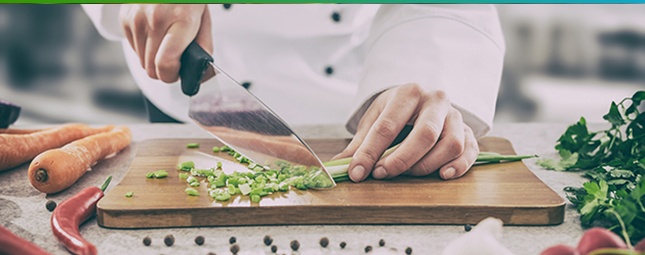3 of the Biggest Waste Culprits in Your Kitchen: Part 3—Knife Skills

Great knife skills--most chefs have them. Knives are the tools of our trade and when put in the hands of skilled craftsman, it is a beautiful thing to watch. I remember watching Iron Chef years back and witnessing Iron Chef Sakai peel an apple with a chef's knife that still amazes me to this day. The years and years it took to acquire that skill is impressive. Knife skills are the fundamental building block of any chef's career. It's the first thing that is taught to students in culinary school and it takes years to become proficient with a knife.
Why are knife skills so vitally important?
- Because people eat with their eyes first and food cut precisely has strong visual appeal.
- Because food needs to be cut uniformly to cook evenly.
- Because proper portioning drives cost and consistency.
- Because safety is top priority--a cook that doesn't know how to handle a knife is a danger to the kitchen and his/her own fingers!
- Because improperly fabricating meat, poultry, fish, or seafood can cost the restaurant a lot of money!
- Because food that is not prepped properly leads to preventable waste--it is like purchasing product and throwing perfectly good food in the compost bin.
I can’t count how many times I have walked into a kitchen to see a prep cook just lop off the tops of tomatoes, zucchini, strawberries, and carrots; or haphazardly trim the rind from melons or citrus fruits, without any thought as to how to get the best yield from that product, let alone the amount of waste they are generating. This trim waste just gets thrown into the compost bin and then out the back door it goes--it’s crazy!
Most chefs assume that the cooks they hire have the necessary skills to prep and fabricate product. In many cases, this is not the truth. Cooks need to be properly trained to prep and fabricate a wide variety of produce, meats, poultry, fish, and seafood. It is essential not only for a chef to be concerned with the cost of the avoidable food waste, but also the impact this waste has on the environment as all the resources used to bring that product into the kitchen have also been wasted.
So what can a chef do to improve the knife skills of the kitchen team and reduce the amount avoidable food waste?
Invest in Proper Knife Tools
Most cooks have their own set of knives. If not, the kitchen should have a set of “house knives” that the cooks can use. Keep these knives sharp with a knife sharpening service that comes in every week. Provide sharpening stones and steels and teach the kitchen team how to properly use them. And if a piece of equipment can do the job equally as well and faster than cutting by hand, it’s a worthwhile investment.Spot Check Your Team's Trimmings
Inspect the garbage cans, compost bins, and prep containers to visually spot check the amount of food being tossed into them. If usable food is spotted, use that as a teaching moment for the cook.
Consider Pre-Cut or Pre-Fab Products
This helps your kitchen cut down on waste, but it’s important to note there is still some waste, it’s just happening upstream.
Pair Experienced Cooks with High-Cost Items
Have the cooks with the most experience and skill handle the tough to fabricate and/or the product with the most value.
Don't Automatically Discard Those Trimmings!
Come up with a solution or process to utilize as many of the trim and scraps as possible. Stocks, soups, and sauces can all be made using some of the trim. Some peels and pulp can be dehydrated and ground, adding flavor to baked goods or smoothies.Recognize That All Kitchens Have Waste
Your goal is to reduce the amount of avoidable waste caused by poor knife skills.
Knife skills are one of the most often overlooked aspects of reducing avoidable food waste and it’s 100% in the control of the chef and the kitchen staff. Those that are in the kitchen and prepping are poised to be on the front line of this ongoing battle. All a chef can do is be transparent and be proactive when it comes to the skills of those with the knives in their hands. Now go forth and teach!
